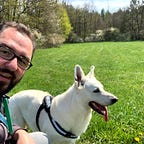Learning Guide: AWS Certified Solutions Architect Associate
SAA-CO2
Introduction
Cloud certifications can help you achieve your career goals, learn and get better in your day to day tasks and improve your odds if you are searching for a job.
Why learn for AWS certification? Out of the 3 major cloud providers, AWS has the most market share with around 50% and a healthy growth rate year over year.
If you look at LinkedIn job postings Worldwide for an Architect role, AWS has 62% of all job postings as of writing the writing of this blog.
Job Postings on LinkedIn for Architect role:
About the exam
This credential helps organizations identify and develop talent with critical skills for implementing cloud initiatives. Earning AWS Certified Solutions Architect — Associate validates the ability to design and implement distributed systems on AWS.
You can read about the exam on this page.
Learning resources
As the main learning resource, I highly recommend Adrian Cantrill’s course:
What is special about this course is that it doesn’t only prepare you for the exam, but also teaches you practical skills, so you will be better prepared for real-life scenarios as an Architect. There is also a very helpful Slack channel where you can ask questions and receive help quickly!
The second resource that is very valuable is practice exams from Tutorial Dojo.
My repository and web page with basic questions and help to get you started.
A note about the learning method:
Active recall and space-based repetition is great and effective method to learn.
You can find more details about the method in this blog or this Youtube video
Self-Paced study
Here is my recommendation on how to get started and be successful with the exam:
- fork my repository with learning material
- make a copy of this file
- start watching Adrian’s training
- as you go write down and answer questions
- use this regex expression to select and remove (replace with empty) all the
<details>tags (they contain the answers to the questions)<(details)>(.|\n)*?</details>, remember to toggle "use regular expressions" in the search box if you are using VS Code. If you are using vim/nvim use this command instead:g/<details>/,/<\/details>/d _ - save the file as a learning session, grade yourself for answers
- IMPORTANT: lookup in the original file if you don’t know the answer at all
- leave the files with dates of each learning session and start the next session from the ones you didn’t know the answers for
- Once you feel that you get the basics, start going through Tutorial Dojo material (it’s much harder than the exam)
When answering the questions I like to use emoji-based rating (see the list below).
You can also bold questions that are important to understand or there is high likelihood that they will appear on the exam.
- give yourself a👍if you’ve answered correctly the first time, skip repetition for the next session
- mark the answer with✋if you’ve answered the question only partially, include the question in the next session
- 👎if you’ve answered the question wrong and had to lookup the answer. Start from those questions in the next session
You can easily add emojis to markdown by typing :emojiname:
- thumbs up:
:thumbsup: - thumbs down:
:thumbsdown: - hand:
:hand:
Here you can see an example of learning material in a markdown file.
Why not jump to Tutorial Dojo straight away?
I often get this question, why create your own questions and answers and not use Tutorial Dojo. The answer is that the questions you create are your questions, they represent bits and pieces that you don’t didn’t know or found interesting or wanted to learn. Those questions are also simpler and often refer to the basics of how things work in AWS.
Tutorial Dojo questions are great but they are specific scenarios to the exam and are typically much harder.
Contribute
As you can see on the https://www.itcertificationsguide.com/#/, I gather learning material for different certifications (Azure, Kubernetes, Terraform and more), but also keep curated links to many useful resources.
If you are learning for the exam or are an expert already and would like to contribute, please feel free to submit a PR and I will be happy to include your notes in the preparation documentation.
My hope is that this will benefit everyone trying to prepare for cloud and cloud-native certifications.
If you would like to reach out, you can comment here or find me on Twitter https://twitter.com/Piotr1215.
Best of luck with the exams :)
